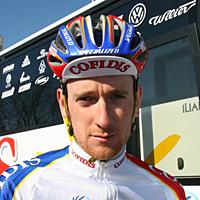
Recently on Cyclingnews.com |
An interview with Bradley Wiggins, April 8, 2006
"It's all about the Arenberg"
For Great Britain's 25 year-old Cofidis professional Bradley Wiggins, the 2006 Paris-Roubaix will mark his fourth attempt at the 'Hell of the North'. He's got mixed feelings about tomorrow, ranging from thoughts of his good friend and former team-mate Saul Raisin still in a serious condition in hospital, to the reintroduction of the Arenberg Forest, and based on current form, expectations placed on himself that he can finish and crack the top 30. Anthony Tan spoke with him on the eve of the race.
 |
Cyclingnews: How are you feeling about this race on Sunday?
Bradley Wiggins: Er... I don't know really! (laughs) I want to well in it, obviously; it's such a big race and I'm going really well - I'm looking forward to it.
Last few days have been sort of funny, really, with what's happened with Saul Raisin; he's a good friend of mine and we're just sort of waiting for news everybody, so it's been quite difficult for a few of us, because some of us were with Credit Agricole.
But I'm looking forward to Sunday; it's a scary and nervous thing going into it because it's such a big event and there's a lot of excitement and fear at the same time. But once you're on the start line, it all seems to go out the window and you just concentrate on the racing.
CN: How much preparation have you done leading up to Roubaix?
BW: We'll, we've done all the Classics in Belgium and on Thursday we did about 15 sectors of pavé and rode over most of the course. A lot of this race is really [based] on experience from past years; it's my fourth time doing this race, so that's sort of had more of an effect than just seeing the cobbles itself. [With experience], you get to really experience the race itself, know where the dangerous points are, things like that.
CN: Some people including Boonen are saying the Arenberg Forest is no better than it was before they stopped racing on it, so what are your feelings?
BW: Yeah, I found it's still just as hard as it was in terms of the pavé, but I think it's a lot safer now because it's not covered by the trees. Before, it was really slippery and it had moss on it; now, the pavé's the same but it's dry. And that's the main thing, because just the slightest bit of rain or humidity in the air, it was like there was an added film on it and it was really quite dangerous. So riding on it the other day, it was still just as hard in terms of the pavé, but it's just not as slippery.
CN: Besides the Arenberg, where would you say the key moments are, given you have ridden this race a number of times before?
BW: Umm... I think it's all down to Arenberg, really - if you arrive at Arenberg still more or less in the front, there's still about 60, 70 guys left. Once you get past Arenberg, the rest of the race - obviously, if you still have the legs - you're on to finish; if you get past Arenberg in a good group, you're on to finish. I've crashed two years in Arenberg, and it is such a decisive point in the race.
CN: What would you be hoping for in terms of a place?
BW: Well, I think I've certainly got the legs to be there in the finish; when I say be there, I mean coming in the first 30. There's a few of us [in Credit Agricole] that have got some ambitions for this race and I've certainly got the legs and the condition to be in the first 30, but there's so much more depending on [whether you finish] Paris-Roubaix - there's a lot of luck, different things that can happen... I'm hoping for weather like it is today, because when it rains, I just don't seem to take the risks that are in the front, so hopefully it's a dry Roubaix this year.
CN: You touched on the subject of luck; how much does that play a role in this race compared to a race like Flanders?
BW: This one's more sort of about the legs, really; Flanders you need a bit more luck than here because the climbs are so narrow - you saw last week that we had to walk up the Koppenberg. This one, you still need a certain amount of luck in this race, but you can get away with a lot more; if you're not well placed, everything can still come back after the [pavé] secteur, whereas in Flanders, you can lose it all on one climb. If you have a puncture or a crash, you have more of a chance of getting back in the race - if that happens in Flanders, it's all over.
